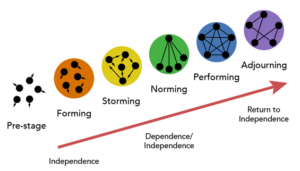
21 Jan Applying the Stages of Group Development to Grants By: Shauna O’Toole, MA, CFRE, GPC
Have you encountered inefficiency, frustration, or even conflict when working with a group to develop a grant proposal? Take heart. This is normal. Most teams struggle and experience conflict before they begin performing at their peak. The Stages of Group Development framework, developed by Bruce Tuckman (1965) describes this process. This blog will briefly describe Tuckman’s framework and then apply these ideas to grant proposal development.
The Stages of Group Development – Image credit: Lumen Learning

- Forming: Team members come together to establish a common goal and get to know one another. This stage is characterized by questions, testing the waters, and politeness.
- Storming: The team begins to take action, but everything does not go smoothly. Discrepancies between individual expectations and the actual team dynamics emerge. The team must explicitly define its strategy and may reevaluate goals. This stage is characterized by inefficiency and confrontation.
- Norming: With a clear strategy in mind, the team will develop effective processes to meet milestones and clarify roles and responsibilities. This stage is characterized by honest communication and growing cohesion.
- Performing: Now that time isn’t wasted deciding how the team will work, the group makes significant progress toward their goals. This stage is characterized by interdependence, trust, and increased output.
- Adjourning: The team is completing its deliverables and evaluating the project. Some members may feel a sense of sadness at the conclusion of the work, while others may lose focus with the termination of the group close at hand. This stage is characterized by a celebration (or other ritual) and reflection.
The Stages of Group Development applied to grants
- Forming: The grant project team (sometimes called internal stakeholders) is selected. The group will determine the scope of the proposal and the amount to request. This is the stage when work plans are developed, and a meeting cadence is established. The team members are excited, and maybe a bit intimidated, about applying for the grant and, hopefully, being awarded.
- Storming: As the first milestones approach, the team encounters communication gaps, misunderstandings, and flaws in the logic or timing of the work plan. Some common challenges at this stage are missed milestones and inaccurate data or narrative. The team cannot exit the storming phase until all stakeholders have “bought in” to the process.
- Norming: A skilled grant professional can help the team exit the storming phase and navigate the norming stage by convening the team, identifying barriers, revising the work plan, and/or clarifying roles. Once people have bought in, this can happen quickly – sometimes within a single meeting. At this stage, it is a good idea to document anything that may have previously been assumed or implied so everyone can refer back to the working norms.
- Performing: Each member of the team knows their responsibilities and gets to work on their tasks. As team members observe their peer delivering on commitments, they may become even more motivated to contribute their portion of the work. By the end of this stage, the proposal will be written and approved.
- Adjourning: The team finalizes its proposal and hits submit! The appropriate personnel closes out the project by documenting the work and saving final copies for posterity. Usually, a grant professional will hustle off to the next project. Don’t miss the opportunity to do a post-mortem on the process, ideally with the whole team present. What worked well? What can you do better next time?
Become a team-building champion
Sometimes a grant professional is overlooked as a leader because our work tends to be more task-based and independent. In reality, the project team needs a strong leader who can clarify objectives and get the team over hurdles. You can be that leader.
AGS has experts in client management who can help you identify your team’s pain points and develop tools for effective work. Reach out to us today to learn more about working with us.
This blog post is aligned with the Grant Professional Certification Institute’s Competencies and Skills.
Competency #2: Knowledge of organizational development as it pertains to grant seeking
Skill 2.6: Identify strategies and procedures for obtaining internal institutional support and approval of decision-makers for grant-seeking activities
Skill 2.7: Identify effects of applicants’ organizational cultures, values, decision-making processes, and norms on the pursuit of grant opportunities
Competency # 3: Knowledge of strategies for effective program and project design and development
Skill 3.1: Identify methods of soliciting and incorporating meaningful substantive input and contributions by stakeholders
Competency # 4: Knowledge of how to craft, construct, and submit an effective grant application
Skill 4.3: Identify project management strategies for submitting high-quality and complete proposals on time
Sources:
Tuckman, B. W. (1965). Developmental sequence in small groups. Psychological Bulletin, 63(6), 384-399. https://doi.org/10.1037/h0022100
https://hr.mit.edu/learning-topics/teams/articles/stages-development
https://courses.lumenlearning.com/wm-introductiontobusiness/chapter/stages-of-team-development/
